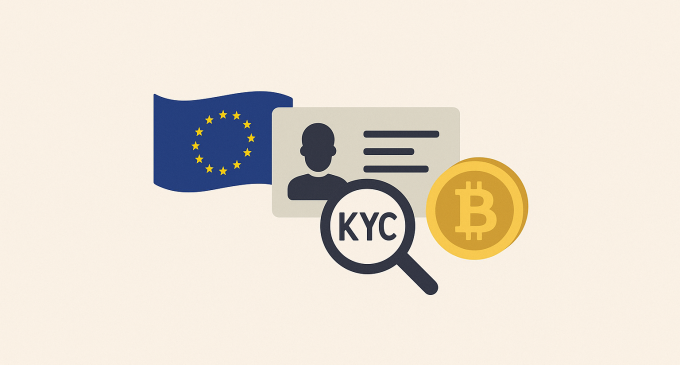
Introduction
The European Union has once again taken a definitive step in shaping the future of digital finance with its newly proposed Know Your Customer (KYC) regulations targeting the cryptocurrency industry. This move, which has sparked a combination of support and concern across global markets, aims to tighten anti-money laundering (AML) controls while expanding transparency in the rapidly evolving crypto ecosystem. As the European Commission and financial authorities push forward with these changes, questions arise about the balance between innovation, user privacy, regulatory reach, and market inclusion.
Background: The Evolution Of KYC In The Crypto Landscape
Know Your Customer, commonly referred to as KYC, refers to the process through which financial institutions verify the identity of their customers to prevent illicit activities such as money laundering, fraud, and terrorist financing. While this standard is long established in traditional finance, it has always posed challenges in decentralized financial systems, particularly within blockchain-based networks and cryptocurrency exchanges.
Over the past decade, as the crypto industry grew exponentially, regulatory frameworks across jurisdictions began to evolve. Early regulations were reactive, aiming to crack down on scams and prevent illegal funding via Bitcoin or altcoins. However, this piecemeal approach proved insufficient as major exchanges such as Binance and Coinbase attracted millions of users globally, often operating across loosely regulated borders.
The European Union, in particular, has moved from initial caution to proactive legislative enforcement. The latest proposals targeting KYC obligations demonstrate a commitment to formalizing oversight mechanisms and protecting the financial integrity of the European economy.
What The New EU KYC Rules Entail?
According to the June 6, 2025 report from CryptoNews, the European Commission has introduced a draft set of regulations that would expand the scope of KYC requirements for all crypto-related entities operating within the EU. This includes centralized and decentralized exchanges, wallet providers, NFT platforms, and even decentralized autonomous organizations (DAOs) if they facilitate financial activity.
The new rules mandate that:
All crypto users conducting transactions exceeding €500 must undergo identity verification.
Exchanges must retain full KYC documentation for a minimum of five years.
Wallet providers and dApp platforms must implement user authentication mechanisms tied to national identification or biometric verification.
An EU-wide registry of licensed and KYC-compliant crypto service providers will be established and updated monthly.
The legislation also proposes the introduction of a real-time monitoring system allowing cross-border cooperation between national financial regulators, tax authorities, and the European Banking Authority (EBA). These measures aim to mitigate risks stemming from anonymous transactions, particularly those facilitated through privacy coins or decentralized protocols.
Implications For Crypto Exchanges And Service Providers
For centralized exchanges such as Binance, Kraken, and Bitstamp, the new regulations will require overhauls of their existing KYC processes to conform with the EU’s strict standards. This includes not only verifying new customers but also retroactively enforcing identity checks on existing users.
Some of the immediate operational impacts include:
Increased Compliance Costs: Exchanges will need to invest heavily in compliance infrastructure, including software, staff training, and legal consultation.
Customer Attrition: Retail users concerned about privacy may shift away from regulated platforms in favor of decentralized alternatives that still allow pseudonymous activity.
Business Restructuring: Smaller crypto businesses may exit the EU market due to the cost of compliance, potentially consolidating the industry under larger players with established regulatory relationships.
Importantly, the rules are not only applicable to companies physically based in the EU. Any platform serving EU citizens will be expected to comply or face potential geoblocking, fines, or delisting from EU-facing trading directories.
The Pushback: Privacy Advocates And Industry Concerns
While the EU maintains that the move enhances consumer protection and financial integrity, not all stakeholders agree. Privacy advocates argue that these KYC requirements encroach on individual freedoms and the foundational principles of cryptocurrency — especially the right to transact anonymously or pseudonymously without state oversight.
There is also concern about the security risks involved in centralizing user data, especially biometric and identity documents. Crypto platforms have historically been targets for cyberattacks, and the mandated storage of sensitive personal information increases the potential impact of data breaches.
Decentralized exchanges (DEXs) and DeFi projects face even greater hurdles. Many operate via smart contracts without centralized control, and mandating KYC compliance may challenge the very nature of these protocols. Projects like Uniswap or Aave might need to reconsider their architecture or implement third-party KYC services, potentially compromising their core value proposition.
Global Ripple Effects: A Template For International Regulation?
The EU’s decision does not exist in a vacuum. Countries such as the United States, Japan, Singapore, and the United Arab Emirates are closely monitoring developments in Brussels. If successful, the EU model could serve as a blueprint for global KYC regulation in crypto.
The Financial Action Task Force (FATF), an intergovernmental body focused on combating money laundering, has repeatedly emphasized the need for standardized crypto regulation. The EU’s move may align with upcoming FATF recommendations and accelerate harmonization across jurisdictions.
There is growing sentiment that comprehensive crypto regulation, including KYC enforcement, could promote institutional adoption and bring legitimacy to a market still seen by many as speculative and high-risk. However, the devil lies in the details — implementation must strike a balance between control and innovation.
The Role of MiCA And The Digital Euro
This wave of regulation coincides with the EU’s broader digital finance strategy, which includes the Markets in Crypto-Assets (MiCA) regulation and the development of the digital euro. MiCA, scheduled for full implementation by the end of 2025, already requires stablecoin issuers and crypto asset service providers to adhere to transparency and reserve standards.
The integration of strict KYC rules complements MiCA by establishing a coherent compliance framework. Together, these policies aim to position the EU as a global leader in regulated crypto infrastructure while also laying the groundwork for seamless integration between public (central bank digital currencies) and private digital currencies.
Long-Term Market Impact: Adaptation Or Exodus?
The crypto market is known for its resilience and adaptability. After years of regulatory uncertainty, many seasoned players have built internal legal teams and developed partnerships with compliance software providers like Chainalysis, TRM Labs, and Elliptic. These companies offer tools that help crypto businesses monitor transactions, verify identities, and flag suspicious activity.
While the stricter rules may initially seem burdensome, they could lead to a more stable and mature market. Institutional investors, in particular, are more likely to engage in regulated environments where legal and reputational risks are minimized.
Still, a potential exodus of smaller firms and retail users cannot be discounted. If compliance costs outweigh business potential, crypto startups may relocate to more lenient jurisdictions or pivot to non-financial blockchain use cases. Additionally, users who value anonymity may flock to privacy-preserving solutions, potentially driving innovation in zero-knowledge proofs, self-sovereign identity, and decentralized ID standards.
Bridging Regulation And Innovation: Is Compromise Possible?
There is an ongoing debate about whether it is possible to harmonize state-imposed regulation with crypto’s ethos of decentralization. Forward-thinking policymakers and industry leaders are exploring solutions like:
Selective Disclosure Protocols: Systems that allow users to verify identity attributes without revealing full identity.
Decentralized Identity (DID): Blockchain-based identity systems that give users control over their own information.
Regulation-Ready Smart Contracts: Contracts programmed to enforce KYC/AML checks while preserving user privacy where possible.
These solutions aim to preserve the benefits of blockchain technology — efficiency, transparency, decentralization — while meeting regulatory expectations.
Conclusion
The EU’s decision to implement stricter KYC requirements for cryptocurrency platforms is a landmark moment in the global digital asset narrative. It signals a shift from exploratory policymaking to active enforcement and oversight. The road ahead may be turbulent, especially for projects unprepared for regulatory scrutiny, but it is also filled with opportunity.
A regulated crypto space in Europe could provide the clarity that investors, developers, and consumers have long demanded. If implemented carefully and with consideration for innovation, these regulations could transform Europe into the most trusted crypto-friendly zone globally.
The challenge lies in execution: building frameworks that are secure, fair, and future-proof. As this transformation unfolds, all eyes will remain on the EU—not just as a policymaker, but as a possible architect of the next digital financial era.







There are no comments at the moment, do you want to add one?
Write a comment